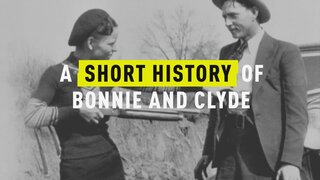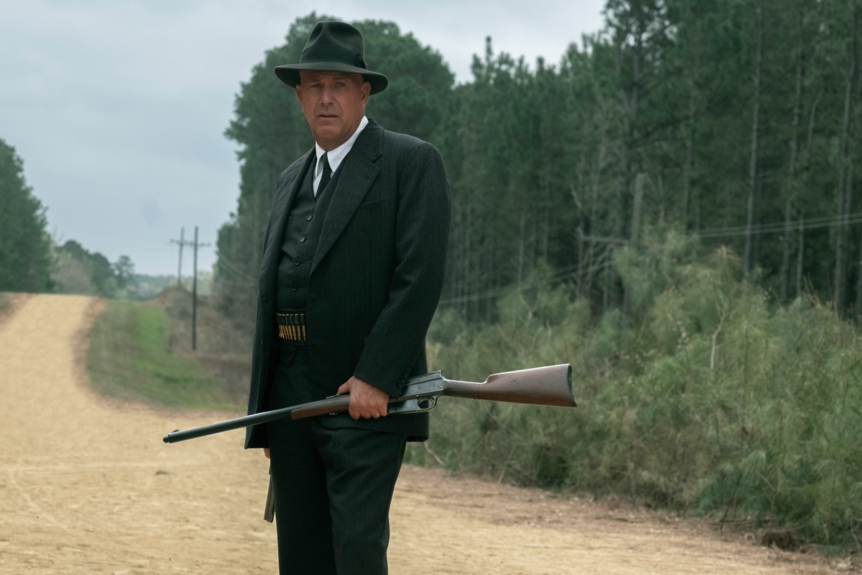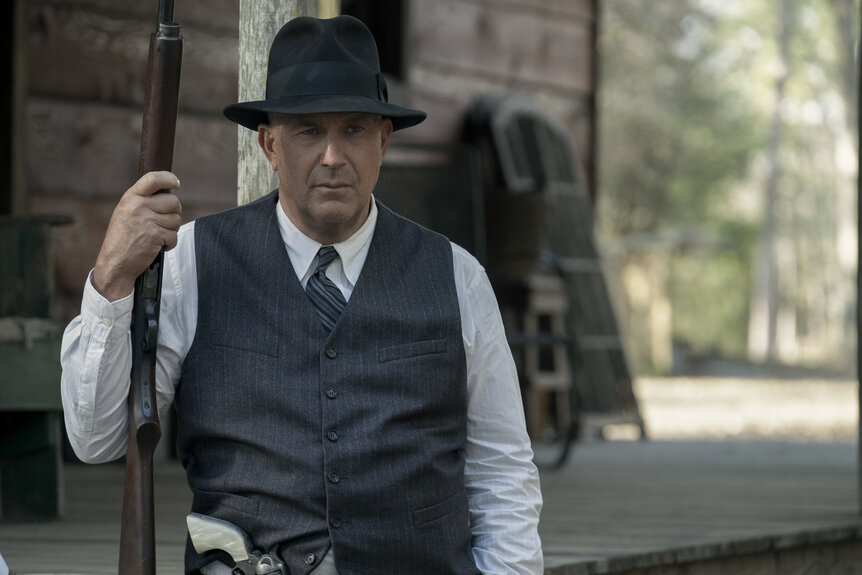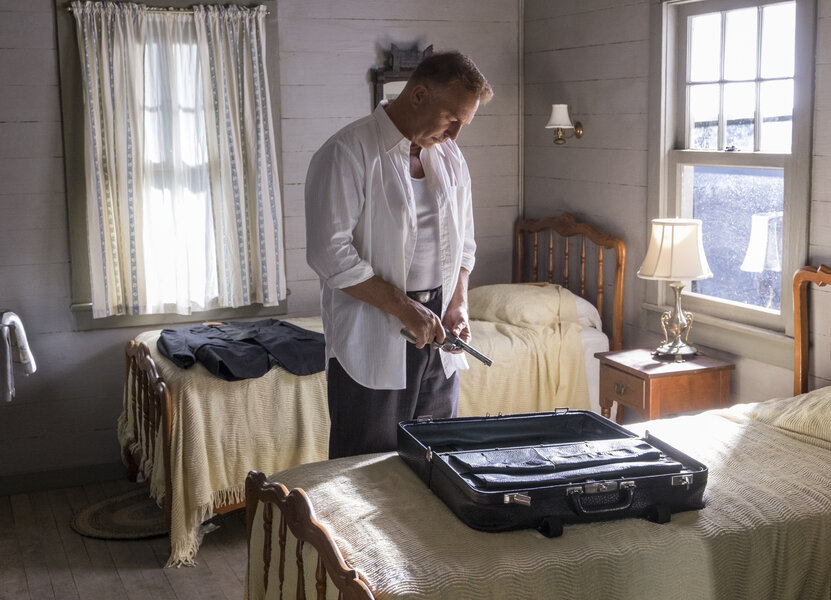Create a free profile to get unlimited access to exclusive videos, breaking news, sweepstakes, and more!
'The Highwaymen' Writer John Fusco Defends Frank Hamer, The Man Who Caught Bonnie And Clyde
John Fusco, writer of "The Highwaymen," discusses the myths surrounding Bonnie, Clyde, and Frank Hamer.
Films are rarely 100 percent historically accurate, but that doesn't stop plenty of viewers from getting upset about tweaks and deviations, no matter how minor. The historicity of "The Highwaymen," a new film directed by John Lee Hancock, has recently become a hotly debated topic amongst true-crime enthusiasts searching for the real story behind the cinema. The new movie, which tells the tale of the lawmen who took down notorious bandits Bonnie Parker and Clyde Barrow, focuses mostly on Frank Hamer — an increasingly controversial figure.
In Arthur Penn's largely fictitious 1967 re-telling of the mythos around the criminal lovers, Hamer is depicted as a mustache-twirling cretin, nefariously seeking to take down the gorgeous rebels on the run. "The Highwaymen" examines the other side of the legend in the hopes of restoring Hamer's own glory. However, a recent article from The Washington Post accuses the film of "whitewashing" the racist history of the Texas Rangers, implicating Hamer in a bevy of indignities.
"The Highwaymen" writer John Fusco chatted with Oxygen.com to give his take on the debate. Discussing his research methods and personal connection to the character, Fusco (also known for his work on "Young Guns" and "Hidalgo") passionately debunked some of the legends surrounding both the sweetheart swindlers and the man who ended their criminal spree.
Oxygen: Thanks for taking the time to talk with us today! What is your position on the criticisms of the film presented in The Washington Post article written by Monica Muñoz Martinez?
John Fusco: It kind of flies in the face of my whole motivation for doing this story in the first place. It was the opposite of whitewashing. Hamer had been vilified and wrongly maligned. I always preface by saying that “Bonnie and Clyde” was one of the greatest movies of all time and I'm part of the generation of filmmakers who was influenced by it — but Hamer was represented by a bumbling, evil buffoon and it brought great pain to his family and to the surviving families of the victims of Bonnie and Clyde. Frank Hamer Jr., who I had tracked down and became friends with when he was in his 90s — he and his mother had even sued Warner Bros. and won a large settlement over it.
I first started digging into this because of a fascination with Bonnie and Clyde. If you look at my work over the years, you can see that I'm fascinated by outlaws, gangsters and rebels. So the 1967 movie lit a fuse for me. But in reality, they weren't Warren Beatty and Faye Dunaway, they were stone cold killers who left a trail of destruction — and the real hero of the story is the guy who was vilified in the movie. I felt it was such an injustice. And his story was so fascinating! He's quite the American hero.
So, finally, Hamer gets his due, and it's being recognized. We screened it for the Hamer family, and his great-grandson broke down crying. His background had been kept from the grandkids because they had been left with this wrongful shame. I felt like we had come so far, and for someone to come along and say, 'Oh, the movie whitewashes Frank Hamer... '
You can dig back into the history of the early Texas Rangers and a lot of the stuff that went on doesn't necessarily reflect on Frank Hamer and who he was. To imply he was a racist — that's what I feel was beyond the pale. Hamer led the fight against the KKK in Texas. He rescued 15 different African-American men from lynch mobs. It's all well-documented.
He really saw himself as a guardian for those marginalized by society. So to imply he was racist is kind of painful. I know that this has all really frustrated John Boessenecker, the writer of the New York Times bestseller “Texas Ranger: The Epic Life of Frank Hamer, the Man Who Killed Bonnie and Clyde.” He brings a lot of clarity to the situation.
Boessenecker agrees that Hamer had a temper. I showed that in the movie, so it's not whitewashed. He was carrying out a job that had to be done. We did show his temper, we did show the old-school tactics.
The bottom line is, I think that after all these years Hamer has finally had his name redeemed. To then throw it in the mud and to try to use a movie to further a cause is a real stretch.
A lot of movies that claim to be based on true stories are truly embellishments on the part of writers and directors but that's clearly not the case here.
JF: That was the point! Look, it's never going to come close to Arthur Penn's film. I get a little frustrated when I hear people say, 'Oh, this is sequel no one asked for,' or a movie that has no reason to exist. The whole thing was that Arthur Penn's film was brilliant, but the true history is fascinating really in itself. So I wanted to stay as close to the history as I could.
Can you describe the research process for this movie?
JF: Once I got the go-ahead for this film, I told the producer I would not move forward unless I got the blessing of Frank Hamer Jr. I knew he was still alive and I tried to reach out to him. He refused to take the call of anyone who had anything to do with Hollywood. So the first bit of research I did was digging into Frank Jr.'s background and I found that he had been one of the last of the Flying Game Wardens, hunting down wildlife poachers. I had Game Warden connections from an earlier project that never got made, but I had done ride-alongs with wildlife cops. So I contacted some of those guys to reach out and they vouched for me.
Hamer Jr. invited me down to Austin, and a truck pulled up and unloaded with all the Hamer boys. We sat in an Austin steakhouse and drank bourbon. I told him what I've been telling you, how I felt that his father had been maliciously misrepresented and that the time had come — the other side of the story should be told. That opened up a lot of conversation, it opened up the scab on the wound. I remember how shaken he was when he recounted what he went through.
He was in high school when his father was out secretly hunting Bonnie and Clyde. Girls were coming to school dressing like Bonnie!
Once we finished that meeting, he shook my hand. He had one of his nephews take a photo and said, 'Consider this our contract, all I ask is you do right by my father.' He made his papers accessible to me. There was a big trunk of fascinating stuff. Early crime scene photos, very primitive. Depositions related to Bonnie and Clyde. Personal letters. I just had a real window into Frank Hamer's world. I spent a lot of time with that material.
Then I traveled to Waco and basically moved into the Texas Rangers research center and they made everything on Hamer available to me. I also tracked down the foremost experts on Bonnie and Clyde, some who had more objectivity than others — some who had, I think, drank the Bonnie and Clyde Kool-Aid.
I dug very deeply into it. I looked into one of the only interviews Frank Hamer ever gave — that was insightful. I thought, when in doubt, if Hamer said something went a certain way, that's the way I was going to lean.
He was a very humble, quiet man. Harrison Hamer said that Frank would be really embarrassed about the movie, about the attention. After the Bonnie and Clyde ambush he had so many offers to do interviews and he only did one, within 24 hours, with a journalist he entrusted — and then another later in life. He was offered $10,000 for his movie rights, which he turned down. He was offered book deals. He was just all about the work. He was publicity shy.
What is your personal connection to Frank Hamer? How did this fascination develop?
JF: Basically, what I had said about the 1967 movie further ignited my interest in gangsters like Bonnie and Clyde. But when I went digging deeply — I realized no one had ever got the drop on Frank Hamer. What I found was the story of a guy whose 50+ year career had spanned from the early days of the Texas Rangers on horseback up through the so-called bandit wars, prohibition, all the way through to where he had to make this transition to motorized vehicles and machine rifles. He had to re-enter the world of the gangsters, an era that had passed him by.
I thought, this guy deserves his side of the story told. And even without Bonnie and Clyde, this guy's story is an epic character study that is absolutely fascinating.
How do you feel about the expansion the Bonnie and Clyde mythos in popular culture?
JF: It's absolutely fascinating! I wanted to get into the cult of celebrity. It started during their time. Of course, because it was the Great Depression, newspaper circulation was plummeting steeply and publishers felt that people did not want to read depressing economic news. They wanted to read about three things: sports heroes, movie stars, or flashy gangsters. And then Bonnie and Clyde got bumped into that pantheon — the fact that they were two lovers on the run, outside society and had hit a bank or two, although rather ineptly. But that was twisted into a beautiful, romantic story.
It's a seductive story!
Yeah! They're sticking it to the man! This was projected on to them. It was a perfect storm because Bonnie wanted to be an actress. She wanted to be a Broadway star or a poet. And Clyde wanted to be a musician, but even his sister and his family said he didn't like to work. He was lazy. But Bonnie was attracted to the bad boys — and when they were getting this kind of press they played into it. They knew how to work it.
Bonnie referred to the people as her public. They were like the Kardashians with guns. If it was the time of the internet, Bonnie would be working Instagram. They branded themselves before branding was a thing.
The bad guy was made into the establishment — the man. It all fit the times of when the 1968 movie was released. And they called the guy Frank Hamer. They didn't realize they were going to be sued. So that myth endured, and it endures today. So it's really rewarding to me to see the buzz and response. They're getting it now. This was a cult of celebrity and the two guys no one knows or remembers, they had an ugly job.
The Penn movie was so popular, it opened the gate to a new wave of filmmaking. And because the film was such cinema greatness, so many people have internalized that movie. They'll tell you they haven't — I'm speaking right now about the Bonnie apologists. There's a whole cult, a whole world out there of people who want to kill me! [laughs] They're like, 'Bonnie never even held a gun!' All this stuff. I have a team of historians and we can obliterate that.
If we look at the man in the White House, it goes to show that a narcissist who is working the press through marginalized society, people living out in middle America who are angry.... I think we can draw an analogy between the Bonnie and Clyde cult of celebrity and Donald Trump.
How did you feel about Kevin Costner's portrayal of Hamer?
JF: I was really so pleased. There's no other way to put it. When this started off it was going to be Robert Redford and Paul Newman.
My first draft of this was ready to go 16 years ago. My producer asked me who I saw in the role and I thought of Redford and Newman coming back like Butch and Sundance for their third and final movie together. I remember he laughed and said, 'We'll never get them but what a great place to start.'
Well, we got 'em! Redford loved it so much that he got on a plane and brought the script straight to Newman. I was working with them for a while, but then Paul got sick.
So, where do you go from there? We tried different combinations, different equations, and it wasn't the same. But something happened over those 16 years: Kevin Costner and Woody Harrelson got to the right age, got that kind of patina on them. They're also closer to the actual ages of Hamer and Gault.
Costner connected with the character of Hamer. With the history. With the burden that he carried. With the injustice that had been done to him. He studied his mannerisms. The Hamer family sent a letter to South by Southwest when the film premiered that I know had a profound effect on Costner when he read it. They said they came to the movie expecting to see a representation of their grandfather, but they ended up watching him. I felt the same! There's no one else out there.
Even if I could do it all over again with Redford and Newman, I wouldn't. In hindsight, having them in it would have become the event. And Hamer would have been lost under it all over again.
What genre of film do you see "The Highwaymen" as falling in to? True crime? Noir? Western?
At it's heart, I think of it as a western. Maybe western slash gangster. It's two guys from the old west colliding with the world of the gangsters. The style, the writing — it's a western.
“The Highwaymen” is ultimately an elegiac American story.
"The Highwaymen" is currently streaming on Netflix.
(This interview has been edited for length and clarity.)
































